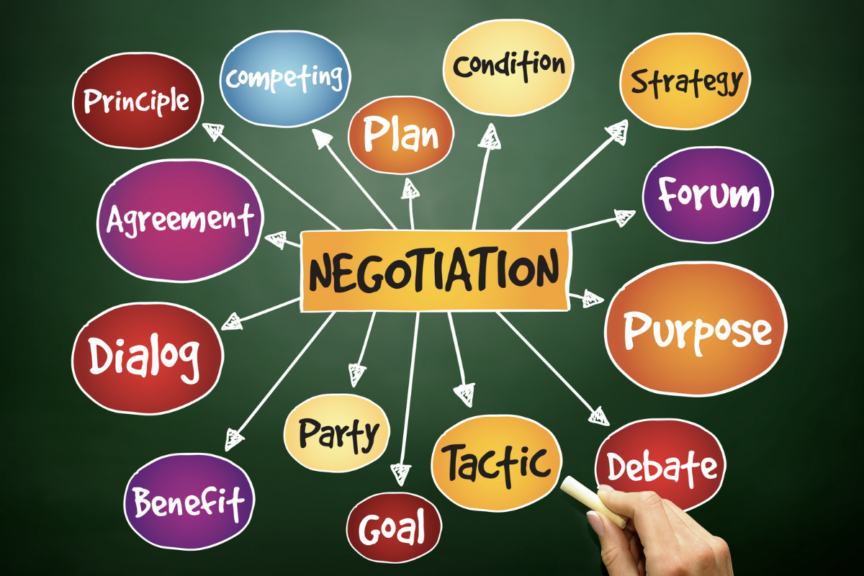Negotiation is a critical skill for any business owner or entrepreneur. The ability to negotiate effectively can mean the difference between closing or losing out on a lucrative deal, getting the best price from suppliers, persuading clients to agree to favorable terms, and overall business success. As an entrepreneur, you need to master the art of negotiation to protect your interests, achieve your goals, and grow your company.
In this comprehensive guide, we will explore business negotiation techniques, entrepreneurial negotiation skills, and strategies to equip you to negotiate successful deals and thrive in business.
The Importance of Negotiation Skills for Entrepreneurs
Negotiation skills are essential for entrepreneurs and small business owners for several key reasons:
Negotiate the best deals – Every business deal involves a negotiation process to reach an agreement. Sharp negotiation skills will enable you to secure the most favorable terms and prices in deals with partners, suppliers, landlords, vendors, and contractors. This helps improve profit margins.
Persuade clients/customers – As an entrepreneur, a strong negotiation technique can help you drive a hard bargain with clients and customers to get ideal project terms, higher fees, scope changes, etc. This boosts revenues.
Raise capital – Investors will not hand over capital easily. Good negotiation is vital to persuade investors, get the best valuation, investment terms, etc. when raising startup funds.
Manage disputes – Disagreements and conflicts are part of business. Negotiation capabilities help resolve disputes with employees, partners, and vendors amicably to avoid legal issues.
Influence stakeholders – Businesses have many stakeholders like lenders, regulators, strategic partners, etc. Negotiation skills help influence them to act favorably towards your interests.
Stand firm under pressure – Entrepreneurs often encounter high-pressure negotiation tactics from larger parties. Mastering negotiation equips you to stand firm and not yield unfairly.
Given how important negotiation is for entrepreneurs across various business activities, developing expertise in negotiation is an investment that yields rich rewards. Let’s now explore how to do it.
Fundamentals of Business Negotiation
Before delving into specific negotiation strategies and techniques, it is vital to first understand the psychology and dynamics of negotiation in business. Some key fundamentals include:
Negotiation is strategic – Do not treat negotiations as zero-sum games where one side wins and the other loses. The best business deals enable both parties to win.
Know your BATNA – Your Best Alternative to a Negotiated Agreement (BATNA) is your strongest leverage. If talks fail, a strong BATNA means you forgo little versus the other party.
Seek shared interests – Discover shared goals, and interests with the other party. This fosters collaborative, win-win deals rather than adversarial zero-sum outcomes.
Separate people from the problem – Do not let emotions or personality differences jeopardize negotiations. Focus objectively on business interests alone.
Prepare extensively – Thorough preparation on your negotiation position, interests, options, and potential trade-offs is key to successful outcomes.
Listen actively – Let the other party speak first. Listen closely to understand their position before responding.
Evaluate options fairly – Impasses arise when parties lock into fixed positions. Consider alternative options fairly to reach mutually agreeable solutions.
With these fundamentals in mind, let’s now explore powerful negotiation techniques and strategies for entrepreneurs.
Key Negotiation Strategies and Skills for Entrepreneurs
Here are crucial negotiation skills and tactics entrepreneurs should master:
1. Understand Your Counterparty’s True Interests
Do not make assumptions about what the other party wants. Ask probing questions to understand their real goals, constraints, and why they want what they asked for. This builds empathy and helps you identify common interests to enable a collaborative process focused on mutual goals.
2. Determine Your Negotiation Priorities
Before negotiations, determine priorities for what concessions you are willing to make and thresholds that are non-negotiable. This will guide your decisions during bidding and compromises.
3. Define Objective Negotiation Parameters
Rather than negotiating based on pure self-interest, set objective rules, standards, and guidelines to add fairness and rationality. Examples include using market prices, industry benchmarks, standard legal clauses, and metrics (like payment timelines), among others.
4. Bid Strategically
Make initial proposals favoring your interests. Then use incremental concessions on low priorities to extract high-priority deal terms from the counterparty. Use non-monetary concessions also as bargaining levers.
5. Listen Actively and Ask Questions
Practice patience. Let the other party explain their position, objections, and reasons first. Listen intently to understand their interests before countering. Ask probing questions too.
6. Aim for Win-Win Outcomes
Look for creative solutions that satisfy both parties’ core interests, not just your own. This fosters goodwill and long-term partnerships versus acrimonious interactions.
7. Use Objective Standards and Metrics
Rather than starting with extreme bids, negotiate based on fair standards and objective calculations. Examples include market prices, industry benchmarks, standard legal clauses, etc.
8. Practice Strategic Compromise
Consider what concessions you can make to build goodwill and offer the counterparty a “win”. Then leverage this to secure your high-priority terms.
9. Communicate Clearly and Precisely
Use clear, precise, and simple language in verbal and written negotiations to avoid misunderstandings. Manage body language also.
10. Stay Calm Under Pressure
Expect negotiation pressure tactics like deadlines, threats, nibbling, hostility, etc. Keep composure and use tact and diplomacy to counter effectively, not emotion.
Conclusion
Mastering negotiation is an essential yet challenging journey. Negotiation mastery enables entrepreneurs to secure optimal deals, resolve disputes, influence stakeholders, and ultimately achieve business success.
By understanding negotiation fundamentals, deploying proven strategies like assessing BATNAs, uncovering interests, bidding strategically, fostering win-win solutions, and staying calm under pressure, business owners can excel at the negotiation table. Hone your skills through extensive preparation, objective analysis, active listening, strategic compromises, and ethical relationship-building.
Join The Ascend Mastermind Today
Ready to elevate your skills and propel your business to new heights? Join the Ascend Mastermind, where you’ll gain exclusive access to expert guidance, valuable resources, and a supportive community of entrepreneurs dedicated to business success and a life of significance. Take the first step towards maximizing your potential and achieving your goals. Join the Ascend Mastermind today and unlock a world of opportunities for growth and success.

